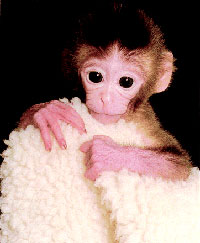US scientists clone monkey embryos
US scientists said that they had managed to clone embryos from a 9-year-old monkey and derived stem cells from them, providing a good way to study the process.

The work was published online by the journal Nature, which took the unusual step of asking another team of researchers to verify the work before publication. That reflects the legacy of a spectacular fraud in stem cell research from South Korea several years ago.
The new work is important because someday researchers hope to use such a process in humans to make transplant tissue that's genetically matched to patients, thus avoiding the risk of rejection.
Scientists had tried for years to produce stem cells through cloning in monkeys, because the animals are so closely related to humans and so provide a good way to study the process. But until now, it has not worked.
The advance is reported by Shoukhrat Mitalipov of the Oregon National Primate Research Center in Portland with colleagues there and elsewhere. Some media outlets, including The Associated Press, had reported their success earlier, based on a presentation at a scientific meeting.
The scientists combined DNA from skin cells of the monkey, a rhesus macaque, with unfertilized monkey eggs that had their own DNA removed. The eggs were grown into early embryos, from which stem cells were removed.
The researchers cautioned that even if their procedure could be used to produce human stem cells, it is far too inefficient to be used in medicine. Human unfertilized eggs are in short supply and are cumbersome to obtain. The monkey work required 304 eggs from 14 female macaques to produce just two batches of stem cells, they wrote.
Still, Dr. George Daley of the Harvard Stem Cell Institute, who was familiar with the work, told the AP it was a "a very important demonstration" that the process is feasible in primates, the group that includes monkeys and humans.
Nature also published a verification of the results by an Australian team. In an e-mail to the AP, the journal said one reason was the highly publicized 2004 fraud that came out of South Korea, where researchers claimed to have produced stem cells from a cloned human embryo.
The journal emphasized that its request did not indicate mistrust of scientists in the cloning field. Instead, the statement said, because of "questions will likely be raised about the veracity of the (American) experiments, given recent history in the cloning field, we view this as a relatively straightforward way of putting these questions to rest."
The Australian study, by David Cram and others at the Monash University, used DNA analysis of the male macaque, the two monkeys that donated eggs for creating the embryos, and the stem cells. The result "demonstrates beyond any doubt" that the stem cells came from cloned embryos, the Australians wrote in their Nature paper.
Subscribe to Pravda.Ru Telegram channel, Facebook, RSS!




